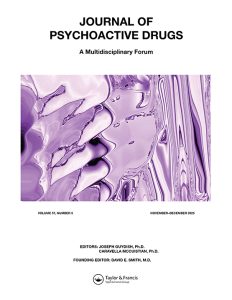- 1-Visionary Plant Medicine Integration by Coder: A Holistic Pathway for Healing and Transformation
- The Diversity of Psychedelic Integration Models: A Journey Through 10 Unique Approaches
- 2-The Holistic Model for a Balanced Life by Bourzat and Hunter: A Comprehensive Approach to Psychedelic Integration
- 3-The Realms of Integration Model by Buller and Moore: A Multi-Dimensional Approach to Psychedelic Integration
- 4-Psychedelic Harm Reduction and Integration (Gorman et al., 2021): A Compassionate Approach to Navigating Psychedelic Experiences
- 5-The Psychedelic-Inclusive Model of the Psyche by Ortigo (2021): A Deep Dive into the Mind’s Mysteries
- 6-Ayahuasca Psycho-Spiritual Integration Model by Cohen (2017): Navigating the Depths of Healing and Transformation
- 7-ACT for Psychedelic Integration (Sloshower et al., 2020): Applying Acceptance and Commitment Therapy to Psychedelic-Assisted Therapy
- 8-The ACE Model by Watts and Luoma (2020): A Compassionate Framework for Psychedelic Integration
- 9-The SAFETY Framework by Westrum and Dufrechou (2019): Guiding Principles for Psychedelic Integration
- 10-The Nature-Relatedness Model by Gandy et al. (2020): Reconnecting with Nature through Psychedelic Integration
 As the therapeutic use of psychedelics continues to gain traction in the field of mental health, new models and frameworks are being developed to help individuals effectively integrate their psychedelic experiences. One such model is ACT for Psychedelic Integration, developed by Sloshower et al. in 2020. This model draws from Acceptance and Commitment Therapy (ACT), a well-established therapeutic approach, and applies its principles to the integration of insights gained through psychedelic-assisted therapy.
As the therapeutic use of psychedelics continues to gain traction in the field of mental health, new models and frameworks are being developed to help individuals effectively integrate their psychedelic experiences. One such model is ACT for Psychedelic Integration, developed by Sloshower et al. in 2020. This model draws from Acceptance and Commitment Therapy (ACT), a well-established therapeutic approach, and applies its principles to the integration of insights gained through psychedelic-assisted therapy.
ACT is based on the idea that psychological flexibility—the ability to be open and present with one’s experiences while taking meaningful action aligned with personal values—is key to mental health. In the context of psychedelics, ACT can help individuals process their experiences and channel the insights they gain into tangible changes in their lives.
The Foundations of ACT for Psychedelic Integration
ACT for Psychedelic Integration is grounded in the six core processes of ACT, which include:
- Present Moment Awareness
- Acceptance
- Cognitive Defusion
- Self-as-Context
- Values
- Committed Action
These processes are designed to help individuals:
- Stay present with difficult emotions or experiences without avoidance.
- Accept challenging or uncomfortable thoughts and feelings rather than struggling against them.
- Separate themselves from their thoughts to avoid being overwhelmed by negative thinking patterns.
- Understand their sense of self as a dynamic and flexible entity rather than something fixed.
- Identify and align with their core values, which guide meaningful actions.
- Take committed action toward goals and values that lead to a fulfilling life.
By applying these principles to psychedelic experiences, ACT provides individuals with tools to process intense emotions, confront unresolved trauma, and translate the profound insights gained from psychedelics into lasting personal growth.
The Six Core Processes of ACT in Psychedelic Integration
1. Present Moment Awareness: Being Fully Engaged
Psychedelics often induce heightened states of awareness, where individuals are fully immersed in the present moment. This can lead to profound realizations and emotional breakthroughs, but it can also be overwhelming. In ACT, present moment awareness involves developing mindfulness, the ability to remain engaged in the here and now without becoming consumed by past regrets or future worries.
During the integration process, ACT encourages individuals to continue practicing mindfulness and staying present with whatever thoughts, emotions, or memories arise. This practice helps people engage with their psychedelic experience in a way that promotes healing and self-awareness. By cultivating present moment awareness, individuals can learn to observe their experiences without judgment, allowing them to fully process and understand the emotions and insights that emerge during a psychedelic journey.
2. Acceptance: Embracing All Aspects of the Experience
Psychedelic experiences can bring forth intense emotions, repressed memories, and uncomfortable thoughts. Rather than resisting these difficult aspects, ACT encourages acceptance. This means making room for uncomfortable feelings and thoughts without trying to suppress or avoid them.
In the context of psychedelic integration, acceptance involves allowing oneself to fully experience the emotional and psychological material that arises during a psychedelic journey, even if it is painful or distressing. This willingness to accept difficult experiences helps individuals process their emotions and come to terms with unresolved issues. ACT teaches that accepting reality as it is—without trying to change or control it—can lead to greater emotional resilience and mental well-being.
3. Cognitive Defusion: Detaching from Unhelpful Thoughts
Many people who seek psychedelic-assisted therapy do so to address negative thinking patterns, such as self-doubt, fear, or trauma-related thoughts. Cognitive defusion in ACT is the process of learning to separate oneself from these thoughts, rather than becoming entangled in them.
Psychedelics often provide individuals with new perspectives on their thoughts and beliefs. Cognitive defusion builds on this by helping people recognize that thoughts are not absolute truths—they are simply mental events. In the integration process, this practice encourages individuals to observe their thoughts with detachment and curiosity, reducing the power that unhelpful or limiting beliefs have over their lives.
4. Self-as-Context: Viewing the Self as Flexible and Evolving
One of the most transformative aspects of a psychedelic experience is the ability to see oneself in a new light. Psychedelics often dissolve the rigid boundaries of the ego, allowing individuals to experience their self as something more fluid and connected to the larger whole. In ACT, self-as-context refers to the idea that the self is not a fixed entity but a dynamic, evolving process.
By integrating the concept of self-as-context, ACT encourages individuals to view their personal identity as flexible, allowing them to step back from limiting self-concepts and embrace the possibility of growth and change. This aspect of the integration process helps individuals incorporate their psychedelic insights into their sense of self, leading to greater self-compassion, flexibility, and openness to change.
5. Values: Identifying What Truly Matters
Psychedelics often help individuals connect with their core values, those deep guiding principles that give life meaning and direction. Many people who undergo psychedelic experiences report feeling a renewed sense of purpose or clarity about what truly matters to them.
In ACT, values play a central role in guiding meaningful action. During the integration process, individuals are encouraged to reflect on the insights gained from their psychedelic journey and identify their core values—what they want their life to stand for. By aligning with these values, individuals can take purposeful steps toward living a life that is more authentic and fulfilling.
6. Committed Action: Turning Insights into Change
While psychedelics can provide profound insights and realizations, the true transformation occurs when these insights are translated into action. In ACT, committed action involves setting concrete goals and taking steps toward them, even in the face of challenges or discomfort.
In psychedelic integration, this might mean making lifestyle changes, pursuing new relationships, setting boundaries, or engaging in new practices that reflect the insights gained from the experience. ACT for Psychedelic Integration emphasizes the importance of turning insights into behavior, ensuring that the lessons learned during the psychedelic journey are applied in a way that leads to long-term growth and change.
Why ACT for Psychedelic Integration is Important
ACT for Psychedelic Integration is important because it provides a structured, evidence-based framework for helping individuals process the intense emotions and insights that often arise during psychedelic experiences. Psychedelics have the potential to facilitate deep healing, but without proper integration, the benefits of these experiences can be fleeting or difficult to implement in daily life.
By applying ACT principles, Sloshower et al. offer individuals and therapists a practical guide for translating the wisdom gained from psychedelics into meaningful, lasting change. ACT’s focus on mindfulness, acceptance, values, and action aligns perfectly with the personal growth often catalyzed by psychedelics, making it an ideal framework for psychedelic-assisted therapy.
The ACT for Psychedelic Integration model by Sloshower et al. offers a powerful and practical approach to navigating the challenges and opportunities presented by psychedelic experiences. By drawing on the six core processes of Acceptance and Commitment Therapy—present moment awareness, acceptance, cognitive defusion, self-as-context, values, and committed action—this model helps individuals make sense of their experiences and integrate them into their lives in meaningful ways.
As the use of psychedelics in therapy continues to expand, models like ACT for Psychedelic Integration will play an essential role in helping individuals process, accept, and grow from their experiences, ensuring that the profound insights gained during a psychedelic journey lead to lasting, positive change.




